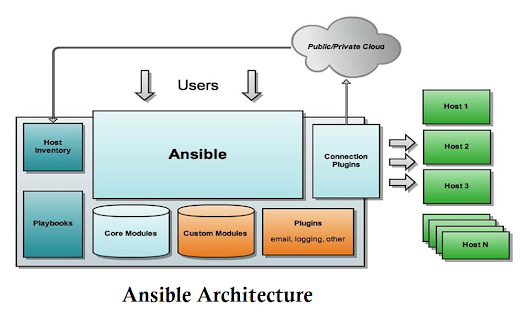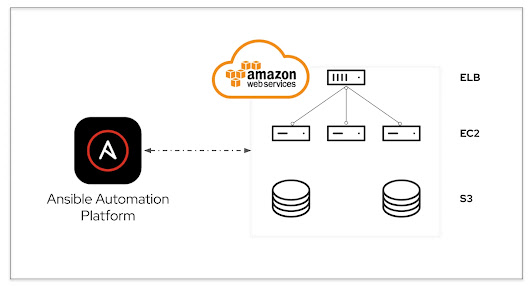Hello guys, if you are preparing for DevOps or senior developer interview then
you must pay attention to modern Software development and deployment tools like
Docker,
Kubernetes, Ansible,
Chef and Salt,
Puppet etc. Gone are the days where you can crack any Java Developer interview by just
answer few core Java questions about
HashMap and
ConcurrentHashMap, nowadays a lot is expected from Java developers. There are coding round where
you need to solve coding problems and then there are multiple rounds of phone
and video interviews where you are asked all of kind questions about Java,
Spring Boot, as well as essential tools like
JUnit,
Mockito,
Docker,
Kubernetes, Ansible etc. While focus could be different, depending upon your role, like
for DevOps knowledge of Ansible is very much required for Developer only basic
knowledge is good enough.
And, if you are looking for Ansible Interview Questions and Answers to quickly revise key Ansible concepts then you have come to the right place. Earlier, I have shared best Ansible Courses for beginners and in this article, I am going to share 20 common Ansible questions from interviews which you every DevOps should know.
These questions covers essential Ansible concepts like Ansible Playbooks, YAML, But, before we get to the top 20 Ansible interview questions you should check out, let me tell you a little bit more about what Ansible really is.
In the span of a few years, Ansible has become the undisputed number one choice for software deployment automation in many organizations. According to Internet reports, more than 1000 companies all over the world use Ansible, which also include famous companies that use Ansible are Intel, Evernote, and Hootsuite.
Ansible is basically an open-source automation tool that can be used for tasks such as configuration management, application deployment, provisioning, and inter-service orchestration. These days, IT environments have become too complex, which means that sometimes they need to scale really quickly. Automation can be used to simplify complex processes and make developers' jobs easier.
Ansible provides many such benefits to developers. For starters, Ansible is a free and open-source tool. It is also very easy to set up and use. You don't need to have any coding skills to make use of Ansible's playbooks. Ansible is pretty powerful and allows you to model highly complex IT workflows. Ansible also allows you to be flexible and customize it according to your needs.
That's all about the 20 popular Ansible Interview questions and answers. I have tried to cover essential Ansible concepts in this article and I intend to keep adding more questions covering more concepts. You can also contribute if you want. And, If you liked this list of the top 20 Ansible interview questions with answers, feel free to share it with your friends and family.
And, if you are looking for Ansible Interview Questions and Answers to quickly revise key Ansible concepts then you have come to the right place. Earlier, I have shared best Ansible Courses for beginners and in this article, I am going to share 20 common Ansible questions from interviews which you every DevOps should know.
These questions covers essential Ansible concepts like Ansible Playbooks, YAML, But, before we get to the top 20 Ansible interview questions you should check out, let me tell you a little bit more about what Ansible really is.
In the span of a few years, Ansible has become the undisputed number one choice for software deployment automation in many organizations. According to Internet reports, more than 1000 companies all over the world use Ansible, which also include famous companies that use Ansible are Intel, Evernote, and Hootsuite.
Ansible is basically an open-source automation tool that can be used for tasks such as configuration management, application deployment, provisioning, and inter-service orchestration. These days, IT environments have become too complex, which means that sometimes they need to scale really quickly. Automation can be used to simplify complex processes and make developers' jobs easier.
Ansible provides many such benefits to developers. For starters, Ansible is a free and open-source tool. It is also very easy to set up and use. You don't need to have any coding skills to make use of Ansible's playbooks. Ansible is pretty powerful and allows you to model highly complex IT workflows. Ansible also allows you to be flexible and customize it according to your needs.
Top 20 Ansible Interview Questions and Answers for DevOps
Here we have compiled a list of the 20 common Ansible Interview questions and answers. If you have used Ansible or worked with Ansible then you most likely know the answer of them but if you don't, you can also join these Ansible courses to revise key concepts.Anyway, let's start with the first question:
1. What is Ansible?
Ansible is basically an open-source automation tool that can be used for tasks such as configuration management, application deployment, provisioning, and inter-service orchestration. These days, IT environments have become too complex which means that sometimes they need to scale really quickly. Automation can be used for simplifying complex processes and making developers' jobs easier.
Here is a nice diagram which explains Ansible architecture:
2. What is the use of Ansible?
Ansible can be used for managing IT infrastructures as well as for deploying software apps to remote nodes.
3. What are the key features of Ansible?
Ansible doesn't have any software or agent to manage the nodes. It also has
a wonderful push architecture.
4. What are the benefits of Ansible?
Ansible provides many benefits to developers. For starters, Ansible is a
free and open-source tool. It is also very easy to set up and use. You don't
need to have any coding skills to make use of Ansible's playbooks. Ansible
is pretty powerful and allows you to model highly complex IT workflows.
Ansible also allows you to be flexible and customize it according to your
needs.
5. What do you mean by Ansible Galaxy?
You can use Ansible Galaxy, which is a tool bundled with Ansible, to create
a base directory structure.
6. What can you tell us about CI/CD?
Continuous Interrogation can be used for streamlining the development as
well as the deployment process. Continuous Delivery refers to the
process where your code, after being pushed to a remote repository, can be
taken to production whenever you want.
Jenkins
is the most popular tool for CI/CD and you should also learn about it.
7. What can you tell us about Configuration Management?
Configuration Management is a process developers follow in order to
keep track of all the updates that are happening inside a system. It is
useful in a situation where a major bug has been introduced into the
code.
8. What do you know about Ansible server requirements?
Basically, you need to have a virtual machine that should be able to run
Linux. You should also have at least Python 2.6 or higher.
9. Tell us about Ansible tasks?
Tasks can be seen as a unit action of Ansible. It is helpful for breaking a
configuration policy into smaller blocks of code.
10. What are some of the basic terminologies in Ansible?
A Controller Machine is useful for provisioning servers that are being
managed.
An inventory is basically a type of initialization file that contains
details about different servers.
A Playbook is a code file that is written in the YAML format.
11. What is an Ansible playbook?
An Ansible playbook is basically a series of YAML-based files that can send
commands to remote computers by making use of scripts.
12. What are some of the differences between variable names and
environment variables?
Variable names can be built by adding strings. It is pretty easy to create
multiple variable names by adding strings. You can access the
environment variable by accessing the existing variables. You can set
environment variables by looking at the advanced playbooks section.
13. What are the uses of tags?
Tags are useful when an extensive playbook is supposed to run. It is
actually an attribute that sets the Ansible structure.
14. Which protocol is used by Ansible to communicate with Linux and
Windows?
Ansible uses the SSH protocol to communicate with
Linux. In Windows, Ansible uses the WinRM protocol.
15. What can you tell us about ad hoc commands?
Ad hoc commands are basically one-line commands that can be used to perform
a certain task.
16. What are the differences between Ansible and Chef?
Ansible is very easy to set up and use. The configuration language used in
Ansible is
YAML.
In contrast, Chef is not at all easy to set up and manage. The configuration
language used by Chef is DSL.
17. How is a YAML file used in Ansible?
Ansible uses YAML files for playbooks because it is more readable than some
of the other formats.
18. What are the differences between Ansible and Puppet?
Ansible is very easy to set up and use. The configuration language used in
Ansible is YAML.
Puppet is not at all easy to set up and manage. The configuration language used by
Puppet is DSL.
19. How can you disable cowsay?
You can disable it by either uninstalling cowsay or by setting up a value
for the environment variable.
20. What is Ansible-doc?
Ansible-doc can be used for displaying the information on modules that are
installed inside the Ansible libraries.
That's all about the 20 popular Ansible Interview questions and answers. I have tried to cover essential Ansible concepts in this article and I intend to keep adding more questions covering more concepts. You can also contribute if you want. And, If you liked this list of the top 20 Ansible interview questions with answers, feel free to share it with your friends and family.
I have no doubt that the questions in this list will transform you from a
complete beginner to an Ansible expert within a matter of weeks or months.
There are a wide variety of questions in this list that will be beneficial to
both absolute beginners as well as intermediate-level learners.
Other Interview Question Articles You may like to
explore
- 40+ Object-Oriented Programming Questions with Answers
- 20 Algorithms Interview Questions for Software Developers
- 20 JUnit Interview Questions with Answers
- 130+ Java Interview Questions with Answers
- 50+ Microsoft SQL Server Phone Interview questions
- 25+ Spring Security Interview Questions with Answers
- 10 Oracle Interview Questions with Answers
- 17 Java Debugging Interview Questions with Answers
- 30 JavaScript Interview Questions with Answers
- 10 Java Locking and Multithreading questions
- 12 SQL Query Interview questions with solutions
- 20+ Spring Boot Interview Questions with Answers
- 25 Recursion Interview questions with answers
- 20 PostgreSQL Interview Questions with Answers
- 50 SQL and Database Interview Questions for Beginners
- 20 Software Design and Pattern Questions from Interviews
- 17 Spring AOP Interview Questions with Answers
- 15 Cyber Security Interview Questions with Answers
- 35 Python Interview Questions for 1 to 2 years experienced
Thanks for reading this article so far. All the best for your DevOps or
Ansible interviews and if you have any questions which don't know answer
or any doubt feel free to ask in comments. You can also drop a comment
if you have any doubts about Ansible, and we will get back to you as
soon as possible.




No comments:
Post a Comment
Feel free to comment, ask questions if you have any doubt.